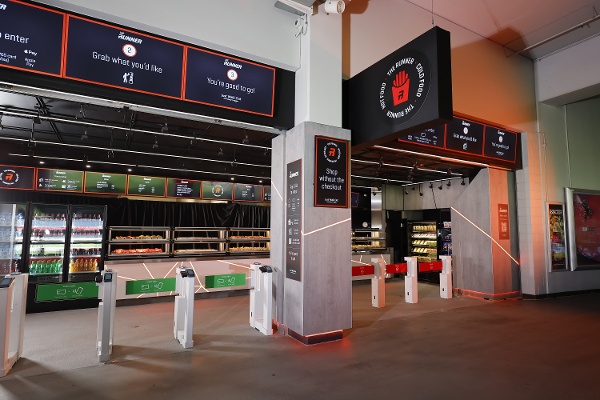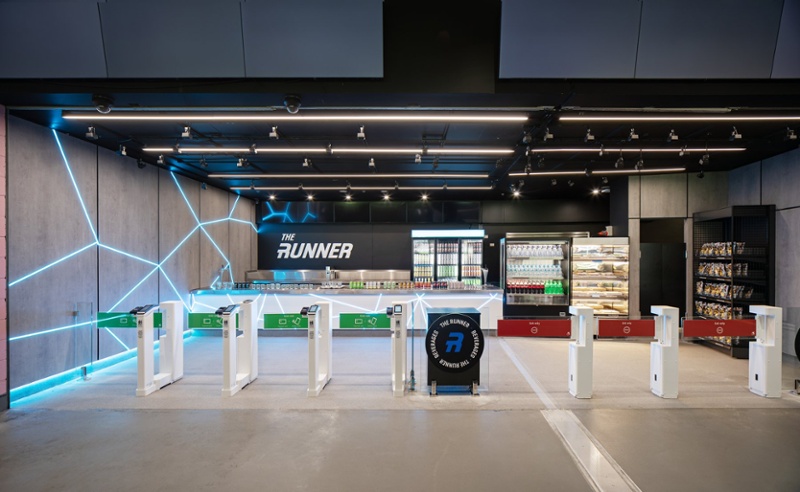Our partnership with the AFL: How Daemon helped create the first Just Walk Out stadium in the Southern Hemisphere
You’ve probably heard of Amazon’s groundbreaking Just Walk Out (JWO) technology. As the name suggests, it allows retail customers to skip the checkout process entirely. They simply tap in with their preferred payment method, in-store cameras track the items they take, and the final cost is deducted when they leave.
We immediately recognised the potential of JWO and were keen to get involved. We acquainted ourselves with the technology and set about helping companies to implement it. The learning curve was steep, but we soon got the hang of it. It wasn’t long before we’d earned a reputation as the place to go for tricky JWO integrations.
Every JWO project is different, but one stands out from the crowd. Earlier this year, we were asked to integrate the technology into the Australian Football League’s (AFL) Marvel stadium. This was a challenging job, requiring some complex thinking on a tight timeline. It wasn’t easy, but we made it work. Here’s how we did it, and what we learned along the way.
Six minute warning
From outside Australia, it’s hard to appreciate just how popular AFL is. Over five million fans have attended games this year, and annual TV audiences regularly top 100 million.
A sport this popular needs venues to match, and none is more impressive than the Marvel Stadium. Built in 2000, Marvel is home to several of Melbourne’s top clubs. It boasts a capacity of over 53,000, making it the third largest AFL ground in the country.
AFL were keen to turn Marvel into a symbol of the sport’s future. The organisation had heard about JWO and spotted its potential immediately. Marvel had the chance to become the first stadium in the Southern Hemisphere to introduce checkout-free payments, beating the nearby Melbourne Cricket Ground to the punch. This would be great for the customer experience, but AFL had to move quickly.
Introducing JWO made sense from a practical point of view. AFL games are split into quarters with breaks of just six minutes in between. This creates a rush at concession stands, with many fans unable to get served before the next quarter begins. Potential sales are lost, and the experience is stressful for fans and staff. By eliminating the checkout process, AFL hoped to make things more pleasant for everyone.
Challenge accepted
Marvel’s JWO journey had a number of invested parties. While the stadium is owned by AFL, the concessions are managed by Delaware North. This is one of the largest hospitality providers in the world, serving half a billion people each year in airports, stadiums and entertainment venues.
After a couple of misfires, Amazon JWO introduced us to Delaware North on the grounds of excellent work we had already completed in the UK. This was November and the AFL season begins in March, meaning we had just five months to get the project up and running.
Although time was tight, we started with a three week discovery process to really understand the F&B operation in the stadium and to get to know our new client. There were a lot of late nights due to time zone differences but that extra effort up front was well worth it.
Making it happen
On the first call, we set out our JWO pedigree. We talked about previous integrations and described exactly how we planned to run the project. This helped to assuage any fears about our competence, and provided a reassuring framework for the weeks to come.
The real turning point came when we described the features of a working JWO stadium. Once our clients understood the technology’s potential, their enthusiasm for the project grew significantly. We started holding three meetings a week and, by the end of the third week, everyone knew their responsibilities.
During the discovery period, we wanted to uncover every potential issue from the point of view of every stakeholder. Some of these were general concerns about shrinkage and data loss, while others were specific problems such as the difficulty of issuing refunds.
Our integration software would be the backbone of the connection between JWO and Delaware Norths ePOS and stock management solutions, allowing them to communicate seamlessly.
This was the key that unlocked JWO for Marvel. Our software verifies the identity of customers and allows them to enter the concessions area. It then checks the contents of their basket and prices it, feeding the data back to Delaware North. Customers are charged the correct amount and data is kept secure throughout.
A win for both sides
The Marvel integration was our biggest test to date, and we’re proud to say we passed with flying colours. Rebuilding a store for conversion to a JWO outlet is a complex project and, although there were architectural issues for Delaware North to deal with on-site, we met our March deadline and the stores opened in May.
Since then, it has been smooth sailing all the way. There have been no faults with the software, and we’ve had reports of up to 1900 JWO orders being placed in a single match. That’s nearly 2,000 fans enjoying a hassle-free way to buy refreshments, not to mention thousands of dollars of extra revenue for Delaware North and AFL.
The software has also given Delaware North valuable insights into consumer behaviour. By connecting EPOS with the company’s stock ordering system, we’ve allowed them to analyse buying habits and ensure that the right products are shipped.
Best of all, we were able to deliver the streamlined customer experience that AFL wanted. Marvel succeeded in becoming the first JWO stadium in the southern hemisphere, receiving widespread praise and national news coverage. As Daemon Head of Engineering Henry Ayres explains, we were thrilled to see the project receiving so much attention.
“I feel incredibly proud of what we achieved at Marvel Stadium. I would perhaps even call it a career-defining moment. So much of what we do is hidden away, so it feels amazing to see our work front and centre in such a high-profile location.”
Achieving this success has filled us with confidence. If we can make JWO work in a 53,000 seater stadium with just a few month’s notice, we can make it work anywhere! If you’d like to discuss your own JWO integration, don’t hesitate to give us a call.


